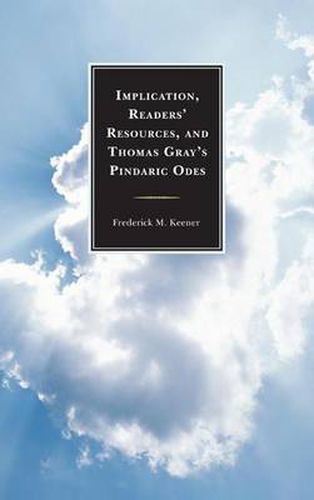Readings Newsletter
Become a Readings Member to make your shopping experience even easier.
Sign in or sign up for free!
You’re not far away from qualifying for FREE standard shipping within Australia
You’ve qualified for FREE standard shipping within Australia
The cart is loading…






Implication, Readers’ Resources, and Thomas Gray’s Pindaric Odes presents an account of the Poets’ Secret, the quite belated, historically recent, discovery by scholars and critics of something many poets have recognized and employed for ages: the sense expressed by allusively parallel parts within a text-thus expressed intratextually rather than only intertextually.
Inferential perception of the implicit sense produced logically and linguistically-by enthymemes, implicatures, and other intratextual features, as well as intertextual ones-can be indispensable for readers’ comprehension of literary as well as other texts, especially their difficult passages. Implication, Readers’ Resources, and Thomas Gray’s Pindaric Odes addresses these elusive matters as they have historically been posed by Thomas Gray’s Pindaric odes of 1757, and mainly the first of them, The Progress of Poesy, a poem that readers have more or less knowledgeably struggled to understand from the outset. The process of disclosing that ode’s sense can be aided by new further reference to Paradise Lost, in the context of Gray’s largely unpublished Commonplace Book, with its extensive, little-studied, and very pertinent use of Plato and Locke.
$9.00 standard shipping within Australia
FREE standard shipping within Australia for orders over $100.00
Express & International shipping calculated at checkout
Implication, Readers’ Resources, and Thomas Gray’s Pindaric Odes presents an account of the Poets’ Secret, the quite belated, historically recent, discovery by scholars and critics of something many poets have recognized and employed for ages: the sense expressed by allusively parallel parts within a text-thus expressed intratextually rather than only intertextually.
Inferential perception of the implicit sense produced logically and linguistically-by enthymemes, implicatures, and other intratextual features, as well as intertextual ones-can be indispensable for readers’ comprehension of literary as well as other texts, especially their difficult passages. Implication, Readers’ Resources, and Thomas Gray’s Pindaric Odes addresses these elusive matters as they have historically been posed by Thomas Gray’s Pindaric odes of 1757, and mainly the first of them, The Progress of Poesy, a poem that readers have more or less knowledgeably struggled to understand from the outset. The process of disclosing that ode’s sense can be aided by new further reference to Paradise Lost, in the context of Gray’s largely unpublished Commonplace Book, with its extensive, little-studied, and very pertinent use of Plato and Locke.